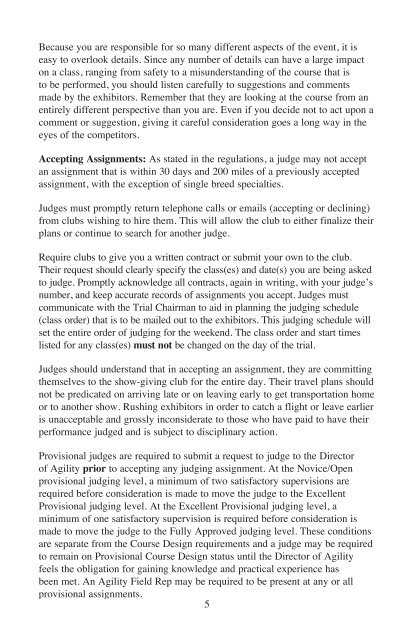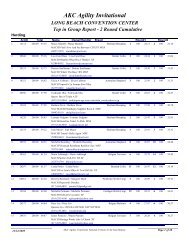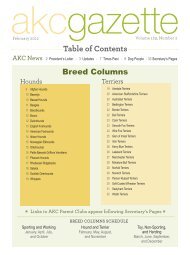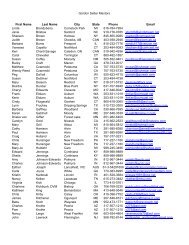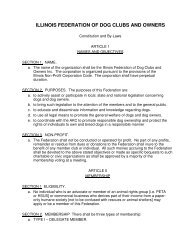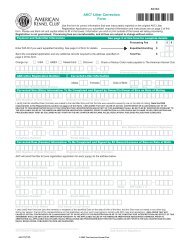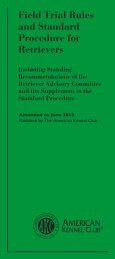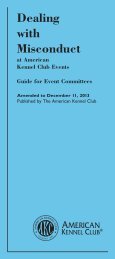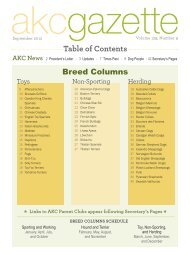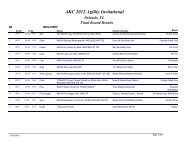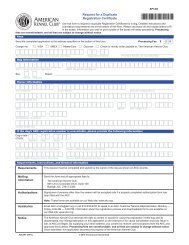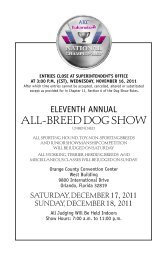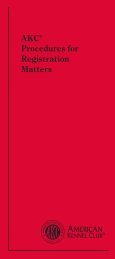You also want an ePaper? Increase the reach of your titles
YUMPU automatically turns print PDFs into web optimized ePapers that Google loves.
Because you are responsible for so many different aspects of the event, it is<br />
easy to overlook details. Since any number of details can have a large impact<br />
on a class, ranging from safety to a misunderstanding of the course that is<br />
to be performed, you should listen carefully to suggestions and comments<br />
made by the exhibitors. Remember that they are looking at the course from an<br />
entirely different perspective than you are. Even if you decide not to act upon a<br />
comment or suggestion, giving it careful consideration goes a long way in the<br />
eyes of the competitors.<br />
Accepting Assignments: As stated in the regulations, a judge may not accept<br />
an assignment that is within 30 days and 200 miles of a previously accepted<br />
assignment, with the exception of single breed specialties.<br />
<strong>Judges</strong> must promptly return telephone calls or emails (accepting or declining)<br />
from clubs wishing to hire them. This will allow the club to either finalize their<br />
plans or continue to search for another judge.<br />
Require clubs to give you a written contract or submit your own to the club.<br />
Their request should clearly specify the class(es) and date(s) you are being asked<br />
to judge. Promptly acknowledge all contracts, again in writing, with your judge’s<br />
number, and keep accurate records of assignments you accept. <strong>Judges</strong> must<br />
communicate with the Trial Chairman to aid in planning the judging schedule<br />
(class order) that is to be mailed out to the exhibitors. This judging schedule will<br />
set the entire order of judging for the weekend. The class order and start times<br />
listed for any class(es) must not be changed on the day of the trial.<br />
<strong>Judges</strong> should understand that in accepting an assignment, they are committing<br />
themselves to the show-giving club for the entire day. Their travel plans should<br />
not be predicated on arriving late or on leaving early to get transportation home<br />
or to another show. Rushing exhibitors in order to catch a flight or leave earlier<br />
is unacceptable and grossly inconsiderate to those who have paid to have their<br />
performance judged and is subject to disciplinary action.<br />
Provisional judges are required to submit a request to judge to the Director<br />
of <strong>Agility</strong> prior to accepting any judging assignment. At the Novice/Open<br />
provisional judging level, a minimum of two satisfactory supervisions are<br />
required before consideration is made to move the judge to the Excellent<br />
Provisional judging level. At the Excellent Provisional judging level, a<br />
minimum of one satisfactory supervision is required before consideration is<br />
made to move the judge to the Fully Approved judging level. These conditions<br />
are separate from the Course Design requirements and a judge may be required<br />
to remain on Provisional Course Design status until the Director of <strong>Agility</strong><br />
feels the obligation for gaining knowledge and practical experience has<br />
been met. An <strong>Agility</strong> Field Rep may be required to be present at any or all<br />
provisional assignments.<br />
5


